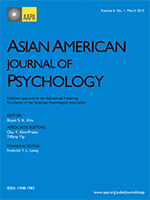Asian American Journal of Psychology | June 2017 Issue
Feature Article & Table of Contents
FEATURE ARTICLE:
Microaggressions and Self-Esteem in Emerging Asian American Adults: The Moderating Role of Racial Socialization
by Christina J. Thai, Heather Z. Lyons, Matthew R. Lee, and Michiko Iwasaki
AAPA would like to congratulate the authors of “Microaggressions and Self-Esteem in Emerging Asian American Adults: The Moderating Role of Racial Socialization,” which has been chosen as the Feature Article of the June 2017 issue. Below is a brief biography of the lead author, Christina J. Thai, and some reflections on this research experience. We hope that the readers of AAJP will find this Feature and the rest of the issue’s articles to be informative and of benefit to their work. The Feature Article may be downloaded for free here, and the June 2017 issue’s Table of Contents is at the end of this post.
Brief Biography of Christina J. Thai
Christina J. Thai graduated from James Madison University in 2013 with bachelor’s degrees in biology and psychology. Christina was a member of JMU’s Cultural and Racial Diversity Studies (CARDS) Lab for three years. As a research assistant, she worked on several projects, including one examining the relationship between Asian Americans’ phenotypic characteristics and experiences of racial microaggressions. After graduation, Christina attended Loyola University Maryland, where she received a Master’s degree in Clinical Psychology. With the guidance of her advisor, Dr. Heather Lyons, Christina successfully completed her thesis on the role of racial socialization as a moderator for experiences of racial microaggressions and self-esteem in Asian American emerging adults. She is now a Counseling Psychology Ph.D. student at the University of Maryland and is a member of the Culture, Race, and Health Lab working with Dr. Matt Miller. When Christina isn’t otherwise occupied as a die-hard Pittsburgh Penguin fan or an amateur Netflix critic she is busy creating a business plan for her potato themed food truck. Christina hopes to continue studying racial socialization and is currently developing her dissertation idea.
Reflections from the Lead Author
When we were asked to reflect on the interesting, fun, or challenging experiences we encountered while writing up this study we thought of many – traveling to present our research, working with a smart and fun team, and emailing and skyping one another constantly. We also reflected on a parallel process we experienced when submitting this study on microaggressions for presentation at a research event at our home institution. Our peer reviewers responded that they would be happy to include our poster in the research event, after we changed references to “microaggressions” to “perceived microaggressions” without asking that we make a similar change to the other study variables that were also measured using self report. Fortunately, around the same time we received feedback on our submission, Dr. Kira Hudson Banks had published “’Perceived’ discrimination as an example of color-blind racial ideology’s influence on psychology” in the American Psychologist. Dr. Banks’ article allowed us to ground our reaction to the review in research and even a bit of humor. According to Dr. Banks “Aliens, extraterrestrial beings, and phantom limbs are ‘perceived’” (p. 312). Asking that we insert the word “perceived” for only one study variable might have two consequences. Like phantom limbs, readers might recognize microaggressions as an experience living only in the mind of the perceiver. Second, as an experience living only in the mind of the perceiver it also removes a perpetrator from the interaction. This experience, and the insights Dr. Banks facilitated, helped us understand the importance of continuing to present and publish on microaggressions to bolster understanding and credibility of this construct.
Banks, K. H. (2014). “Perceived” discrimination as an example of color-blind racial ideology’s influence on psychology. American Psychologist, 69, 311–313. doi:10.1037/a0035734
AAJP VOLUME 8, ISSUE 2 | TABLE OF CONTENTS
[Articles available on APA PsycNET]
FEATURE ARTICLE: Microaggressions and Self-Esteem in Emerging Asian American Adults: The Moderating Role of Racial Socialization [Free download of article]
Christina J. Thai, Heather Z. Lyons, Matthew R. Lee, and Michiko Iwasaki
Reciprocal Relations Between Social Self-Efficacy and Loneliness Among Chinese International Students
William Tsai, Kenneth T. Wang, and Meifen Wei
Social Anxiety in Asian Americans: Integrating Personality and Cultural Factors
J. Hannah Lee and A. Timothy Church
Parenting Variables Associated With Growth Mindset: An Examination of Three Chinese-Heritage Samples
Joanna J. Kim, Joey Fung, Qiaobing Wu, Chao Fang, and Anna S. Lau
Loss of Face, Intergenerational Family Conflict, and Depression Among Asian American and European American College Students
Zornitsa Kalibatseva, Frederick T. L. Leong, Eun Hye Ham, Brittany K. Lannert, and Yang Chen
Mental-Illness Stigma Among Korean Immigrants: Role of Culture and Destigmatization Strategies
Meekyung Han, Rachel Cha, Hyun Ah Lee, and Sang E. Lee
Developing Minority Leaders: Key Success Factors of Asian Americans
Thomas Sy, Susanna Tram-Quon, and Alex Leung
An Examination of Attitudes Toward Gender and Sexual Violence Among Asian Indians in the United States
Pratyusha Tummala-Narra, Jaclyn Houston-Kolnik, Nina Sathasivam-Rueckert, and Megan Greeson
MMPI-2 Profiles Among Asian American Missionary Candidates: Gendered Comparisons for Ethnicity and Population Norms
Christopher H. Rosik, Grecia Rosel, Meg M. Slivoskey, Katie M. Ogdon, Ian K. Roos, Tiffany M. Kincaid, and Mandalyn R. Castanon
Read about the last issue of AAJP: https://beta.aapaonline.org/2017/06/03/aajp-vol-8-no-2/
For more information on AAJP: http://aapaonline.org/publications/asian-american-journal-of-psychology/.
Contact: Bryan S. K. Kim, Ph.D., Editor, Asian American Journal of Psychology, bryankim@hawaii.edu




